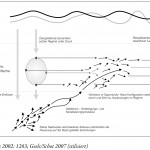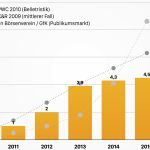1. Dezember 2017
Ende November ist die Österreichische Zeitschrift für Soziologie 42(4) erschienen – und mit ihr mein Artikel »Der Akteur: Konstruktion und Dekonstruktion einer Beobachtungskategorie« (SpringerLink | Preprint).
Der Beitrag vertritt die These, dass akteurzentrierte und systemtheoretische Zugriffsweisen weniger in einem konkurrierenden als in einem komplementären Verhältnis zueinander stehen, da sie ihr soziologisches Seziermesser auf divergenten Untersuchungsebenen ansetzen. Vor diesem Hintergrund wird zunächst die Konstruktion der Beobachtungskategorie des „Akteurs“ im akteurzentrierten Institutionalismus beleuchtet, bevor die Dekonstruktion individueller und überindividueller Akteure als stabile Handlungseinheiten in der Theorie sozialer Systeme nachgezeichnet wird. Daran anknüpfend werden am Beispiel der durch die Onlinetechnologien angestoßenen Transformationsprozesse die jeweiligen Beobachtungsschwerpunkte und -lücken illustriert. Der Text mündet in einem Plädoyer für ein produktives Nebeneinander beider Perspektiven.
20. Oktober 2017
In diesen Tagen ist mein Artikel »Open-source projects as incubators of innovation: From niche phenomenon to integral part of the industry« in Convergence erschienen:
Over the last 20 years, open-source development has become an integral part of the software industry. Against this backdrop, this article seeks to develop a systematic overview of open-source communities and their socio-economic contexts. I begin with a reconstruction of the genesis of open-source software projects and their changing relationships to established information technology companies. This is followed by the identification of four ideal-type variants of current open-source projects that differ significantly in their modes of coordination and the degree of corporate involvement. Further, I examine why open-source projects lost their subversive connotations while, in contrast to former cases of collective invention, remaining viable beyond the initial phase of innovation.
19. September 2017
Im Sommer ist ein Diskussion Paper von Renate Mayntz mit dem Titel »Zählen – Messen – Entscheiden: Wissen im politischen Prozess« (PDF) erschienen, das sich mit der Quantifizierung politischer Entscheidungsprozesse auseinandersetzt:
»Quantifizierung heißt nicht nur Zählen, sondern auch Indexbildung, Ranking und formale Modellierung […] Der Rückgriff auf quantifiziertes, formalisiertes Wissen dient dabei nicht nur der Effektivität politischer Intervention, sondern auch ihrer Legitimierung.
Weiterlesen »
1. August 2017
Ende Juli ist der von Bielefelder Kolleginnen und Kollegen herausgegebene Band »Society, Regulation and Governance New Modes of Shaping Social Change?« bei Edward Elgar Publishing erschienen. Darin finden sich Beiträge von A.-L. Beaussier, A. Bora, E. Carmel, M. Huber, D. Kuchenbuch, M. Mölders, P. Münte, R. Paul, H. Rothstein, J.-F. Schrape und L. Viellechner.

This book brings together sociologists, political scientists, legal scholars and historians to produce an interdisciplinary critical evaluation of alleged ›new modes‹ of social change, specifically: risk, publics and participation. It makes three key contributions by:
- offering a consolidation and re-appraisal of a debate that has become increasingly vague with its academic and political proliferation
- identifying a uniting conceptual-analytical core between regulation and governance which explains the adaptability and innovation-mindedness of processes of ›shaping society‹
- re-focusing on the ›essence‹ of regulation and governance approaches – intentional modes of social change.
Reinlesen lässt sich in den gelungenen Band auf ElgarOnline; mein Kapitel findet sich in einer frühen Version als Discussion Paper auf EconStor.
6. Juli 2017
Aus: Dolata, Ulrich / Schrape, Jan-Felix (2018): Kollektivität und Macht im Internet. Wiesbaden: Springer VS (S. 24–30).
Vieles, was Bewegungen und Gemeinschaften auszeichnet, hat sich mittlerweile [in den Online-Bereich] verschoben: kollektive Meinungsbildung und Abstimmung, politische Kampagnen und Mobilisierung, Organisierung und Koordination der Aktivitäten, fachlicher Austausch und gemeinschaftliche Produktion.
Die genannten sozialen Merkmale der Institutionalisierung kollektiver Akteure werden dadurch zwar nicht außer Kraft gesetzt. Sie werden allerdings substanziell erweitert um neue Organisierungs- und Strukturierungsleistungen von Kommunikation, Produktion und Protest, die das Internet und seine Plattformen als technologische Infrastrukturen bieten.
Dementsprechend lässt sich die Institutionalisierung des Kollektiven heute nicht mehr als rein sozialer, sondern nur noch als soziotechnischer Prozess auf angemessene Weise abbilden: als systematische Verschränkung von sozialen und technischen Organisierungs- und Strukturierungsleistungen, deren Zusammenspiel allerdings von Fall zu Fall erheblich variiert […].
Weiterlesen »
17. Juni 2017
Anfang Juli erscheint das von mir und Ulrich Dolata zusammengestellte Buch »Kollektivität und Macht im Internet: Soziale Bewegungen – Open Source Communities – Internetkonzerne« (Amazon, 19,90 Euro). Das Einführungskapitel lässt sich schon jetzt als Leseprobe bei Springer VS herunterladen.

Das Buch geht den Fragen nach, wie sich die vielfältigen neuartigen Formen von Kollektivität in der Internetgesellschaft voneinander unterscheiden und typisieren lassen und welche Rolle die technischen Infrastrukturen des Netzes für deren Entstehung bzw. Verstetigung spielen. Es wird diskutiert, auf welche Weise sich die Mobilisierung und Organisierung sozialer Bewegungen durch Social Media verändert, wie Arbeits- und Entscheidungsprozesse in Open-Source-Communities strukturiert sind und über welche ökonomische und regelsetzende Macht die großen Internetkonzerne als wesentliche Gatekeeper und Kuratoren der Kommunikation im Netz heute verfügen.
















